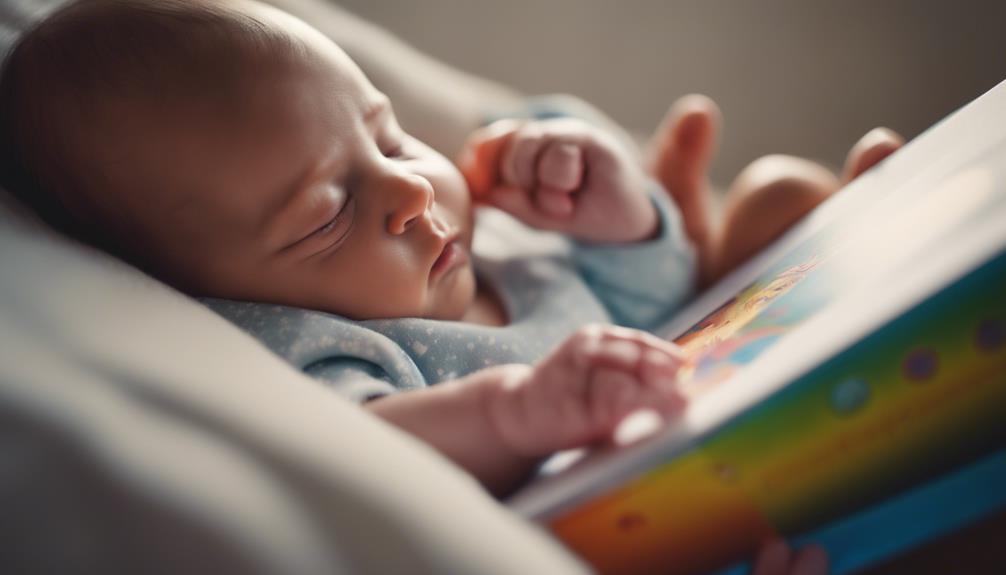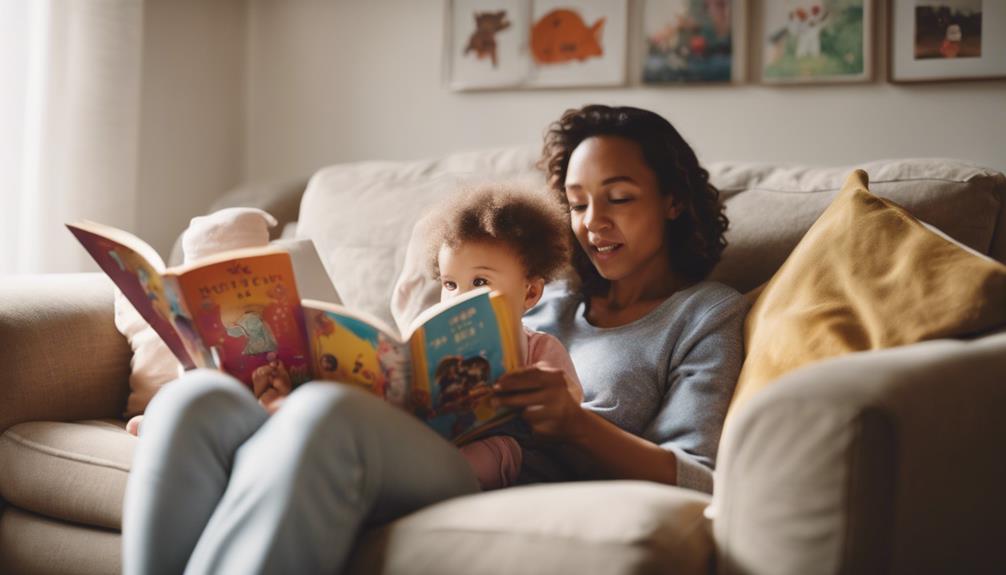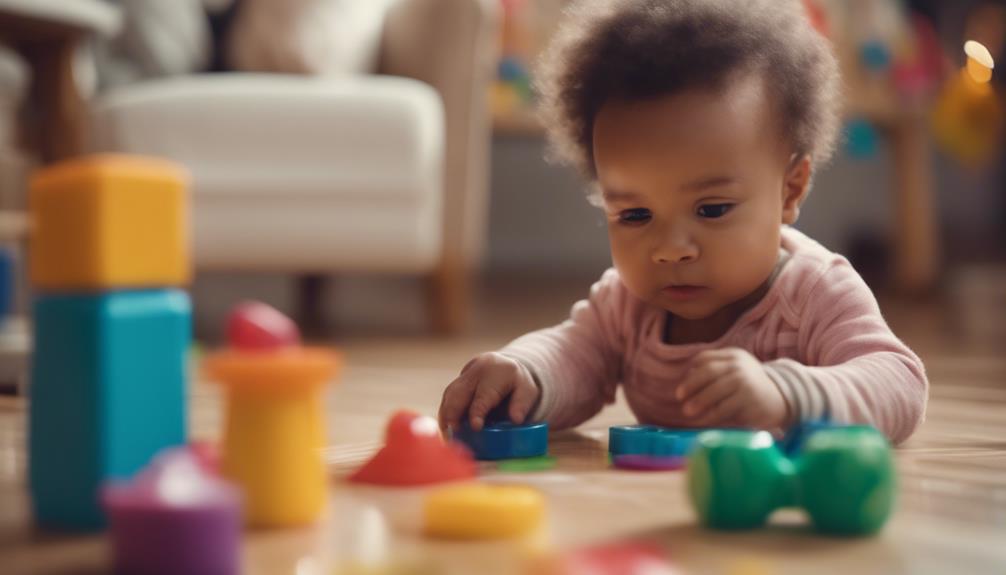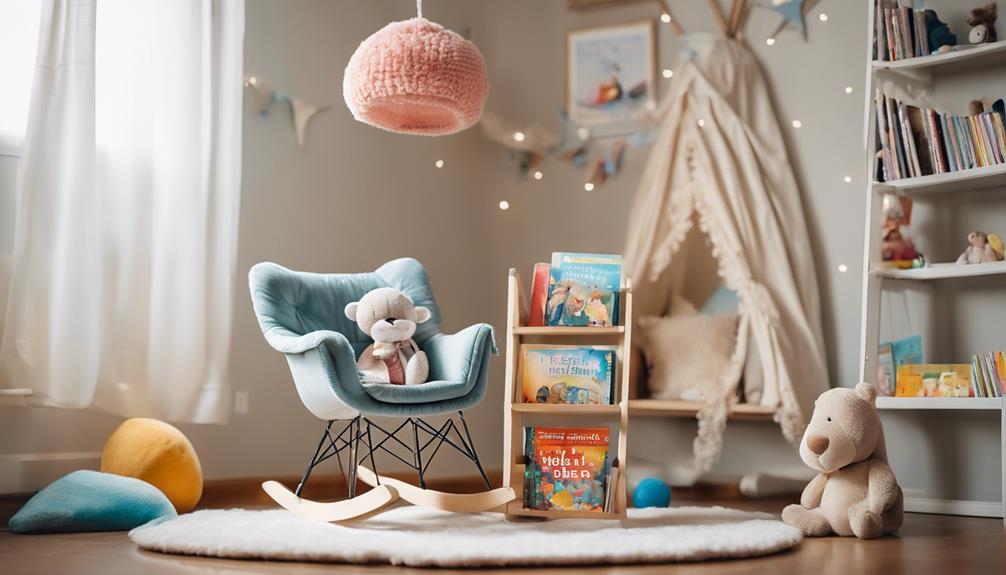It is important to begin reading to your baby right from when they are born; it is crucial for brain development and language skills. Make it a regular part of your daily routine during peaceful times to form a strong bond with your baby. By consistently engaging in this activity, you are not just sharing stories but also establishing a solid foundation for their passion for learning. Studies have shown that early exposure to language through reading has a positive impact on cognitive development. If you continue this practice, you will uncover additional ways reading can enhance your baby’s development as they mature.
Key Takeaways
- Start reading to your baby from birth.
- Make reading a daily routine.
- Read during calm moments for better focus.
- Use reading as a bonding activity.
- Be patient and consistent with reading sessions.
Importance of Early Reading
Reading to your baby from the earliest days of their life is essential for their brain development and language skills. It's never too early to start reading to your little one. The benefits of reading go beyond just storytelling; it plays a vital role in shaping your baby's language development and building their vocabulary.
By engaging in reading sessions with your baby, you aren't only fostering their early literacy skills but also strengthening the parent-child bond. When you read to your baby, you're providing them with a rich language environment that stimulates their cognitive development. This early exposure to language sets the foundation for a love of learning and exploration in your baby.
Additionally, babies introduced to reading early tend to read earlier themselves, highlighting the importance of instilling a passion for reading from a young age. So, grab a book, cuddle up with your little one, and commence on a journey of language, learning, and bonding through the magic of storytelling.
Developmental Benefits of Reading

To fully grasp the developmental benefits of reading to your baby, it's important to understand how this early practice influences their cognitive growth and language acquisition.
Reading to your baby from infancy plays an essential role in their brain development, aiding in the formation of neural pathways that support language skills. Babies who are introduced to reading early on often exhibit larger vocabularies by the age of 3, setting a strong foundation for future learning.
Additionally, engaging in storytime with your little one not only enhances bonding but also helps them develop essential cognitive and social-emotional skills. The American Academy of Pediatrics recommends starting reading sessions early to maximize these developmental benefits.
Age-Appropriate Reading Practices

When it comes to reading to your baby, it's crucial to tailor your approach based on their age.
Early literacy development begins with interactive reading experiences that engage your little one's senses.
Establishing bedtime story routines can't only foster a love for books but also provide valuable bonding moments.
Early Literacy Development
Enhancing your baby's early literacy development involves selecting age-appropriate reading materials that cater to their developmental stage and cognitive abilities. To support your baby's early literacy journey effectively, consider the following:
- High-Contrast Books: Newborns benefit from high-contrast books with bold patterns and colors that stimulate their visual senses and support early brain development.
- Interactive Stories: Toddlers thrive on interactive stories that engage their curiosity and encourage participation, fostering a love for reading and enhancing language acquisition.
- Age-Appropriate Reading: Introducing books with varying textures, sounds, and simple narratives tailored to your baby's developmental stage encourages exploration and interaction with reading materials, laying a strong foundation for literacy skills.
Interactive Reading Experiences
For babies, interactive reading experiences involve engaging with books through touch, sound, and visuals, fostering early literacy skills and cognitive development. Age-appropriate reading practices include using books with textures, flaps, and mirrors for newborns.
Encouraging infants to turn pages, point at pictures, and interact with books not only captivates their attention but also aids in their overall development. These interactive elements help babies engage with the story, enhancing language development and comprehension.
Bedtime Story Routines
Want to create a calming and consistent bedtime routine for your baby? Establishing a bedtime story routine can be a wonderful way to help your little one wind down and prepare for sleep.
Here are some key points to keep in mind:
- Start Early: Begin reading to your baby from infancy to introduce the bedtime ritual. Even newborns benefit from hearing soothing stories before bedtime.
- Choose Age-Appropriate Reading Material: Opt for short and gentle stories for young babies, gradually progressing to more interactive books as they grow. This progression supports language development and cognitive skills.
- Build Emotional Bonds: Bedtime stories create a special bonding time between you and your baby. This emotional connection not only fosters a positive association with reading and bedtime but also instills a lifelong love for books in your child.
Reading to Newborns

Start reading to your newborn as early as possible to support their brain development and foster a love for books. Research shows that reading to newborns, even before birth, is beneficial.
Babies love being read to, and it helps build their vocabulary from the very beginning. Introduce books designed for newborns, with high-contrast colors and simple patterns that captivate their attention.
Even for a few minutes a day, reading to newborns can have a lasting impact on their cognitive development.
Experts recommend beginning to read to babies before their first birthday. Incorporating reading into daily routines, even with short sessions, is essential for newborns.
Starting to read to babies early can have a positive impact on their language skills and overall development. Reading to babies is a valuable activity that can be initiated at any time, providing numerous benefits for their growth.
Reading to 3-6 Month-Olds

Reading to 3-6 month-old babies lays a strong foundation for their language development. When reading to babies in this age group, consider choosing board books with simple illustrations and textures to capture their attention. These features not only make the books visually appealing but also provide tactile stimulation, enhancing the reading experience for your little one.
Additionally, interactive features in these books can help engage babies and promote their cognitive development by encouraging them to explore and interact with the story.
Opt for board books with interactive elements like lift-the-flap or touch-and-feel components to keep your baby engaged during reading sessions.
Choose books with vibrant colors and high-contrast images to stimulate your baby's developing vision and visual recognition skills.
Reading to your 3-6 month-old can create precious bonding moments between you and your baby, fostering a love for books and storytelling from an early age.
Reading to 6-12 Month-Olds

For 6-12 month-olds, engaging in reading sessions can greatly contribute to their vocabulary and language skills development. Interactive books designed for babies with textures, sounds, and simple stories are particularly beneficial during this stage.
Reading aloud to 6-12 month-olds not only helps build their vocabulary but also enhances their pre-literacy skills. Encourage your baby to explore books by allowing them to touch, point, and even attempt to turn the pages. This interaction fosters their cognitive development and attention span.
Introducing books to 6-12 month-olds sets the foundation for a lifelong love for books. By engaging with language-rich content early on, babies begin to develop essential language skills that will serve them well in the future.
Reading to your baby at this age is a wonderful way to bond and create positive associations with books. So, make sure to incorporate reading sessions into your daily routine to nurture your baby's growing love for books and language skills.
Reading to Toddlers

Engaging with toddlers through reading sessions is an important way to promote their language development and cognitive skills. As babies grow into toddlers, continuing to read to them offers numerous benefits for their overall development.
Here's why reading to toddlers is essential:
- Enhancing Pre-Literacy Skills: Reading books to toddlers exposes them to language patterns, vocabulary, and storytelling structures, laying a strong foundation for future reading and writing abilities.
- Encouraging Active Participation: Reading together with toddlers allows for interactive sessions where they can ask questions, share their thoughts, and engage with the story actively.
- Fostering a Love of Reading: By regularly reading to babies and toddlers, you instill a love for books and stories early on, setting the stage for a lifelong appreciation of reading and learning.
Frequently Asked Questions
When Should I Start Reading to My Infant?
Start reading to your infant as early as possible. Engage in short sessions daily to promote brain development and bonding. Reading before their first birthday is ideal for maximum benefits. Initiate this valuable activity for lasting impact.
When Should I Start Reading to My Unborn Baby?
Start reading to your unborn baby as soon as you can. Even before birth, it can support early development. Establishing this habit early on can have lasting benefits for both brain development and bonding.
When Should You Read When You Have a Baby?
Start reading to your baby as soon as possible. Incorporate reading into daily routines for short sessions. Reading to your baby early, even for a few minutes a day, supports brain development and fosters a love for books.
What Is the Earliest Age to Start Reading?
Start reading to your baby as soon as they're in your arms. Those tiny ears are ready for your voice. Even a few minutes a day can light up their world and kickstart their development.
Conclusion
So, when should you read to your baby? The answer is simple – as soon as possible!
From newborns to toddlers, early reading has numerous developmental benefits that can set the foundation for a lifetime of literacy and learning.
So grab a book, cuddle up with your little one, and immerse them in the magical world of storytelling.
Who knows, you might just create a future bookworm in the making!










